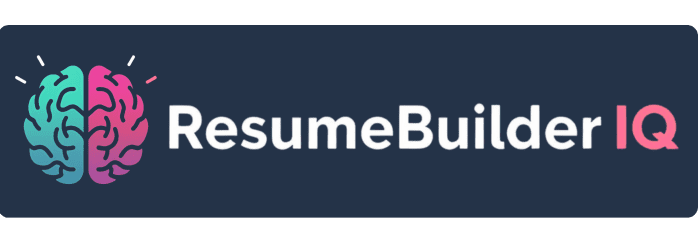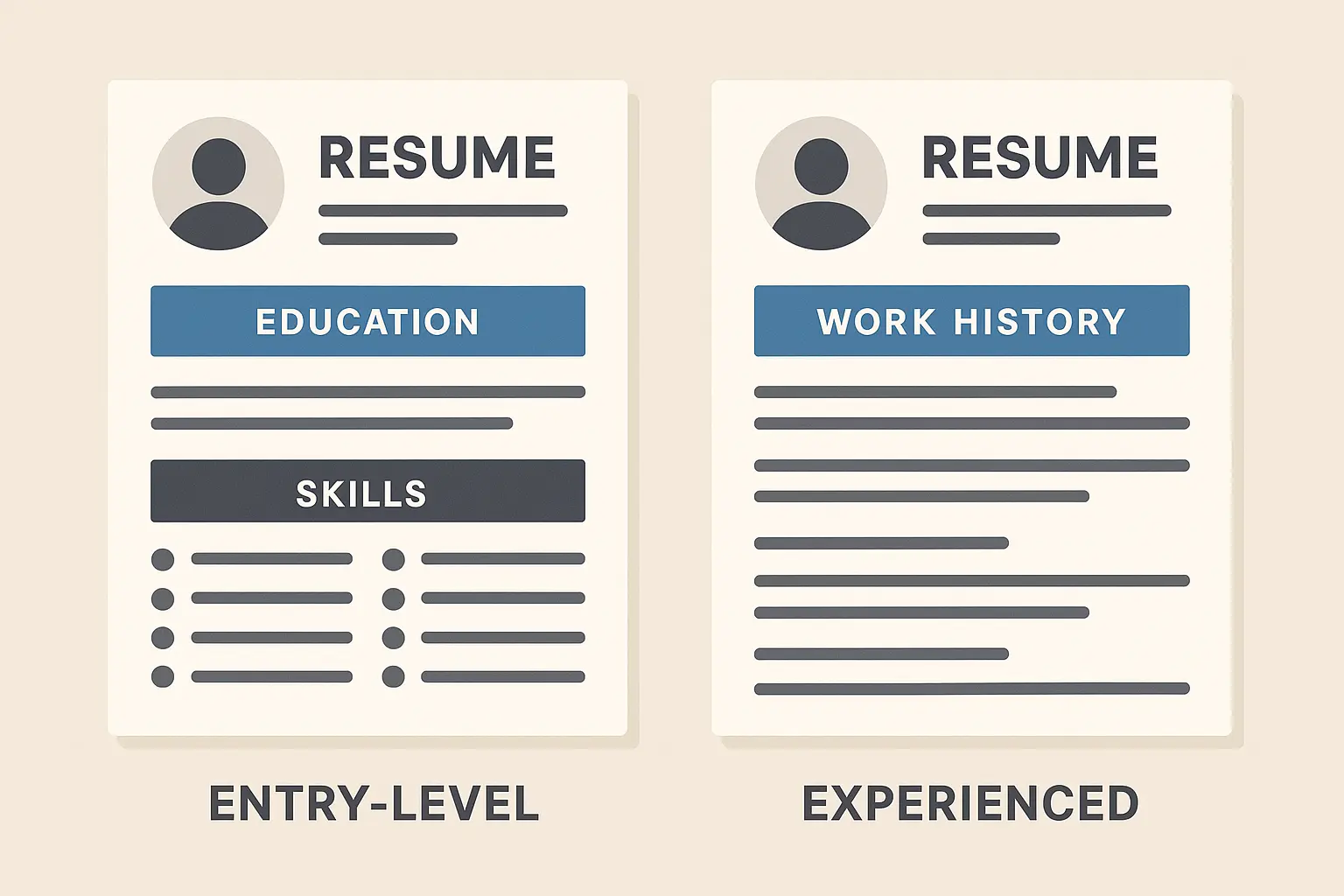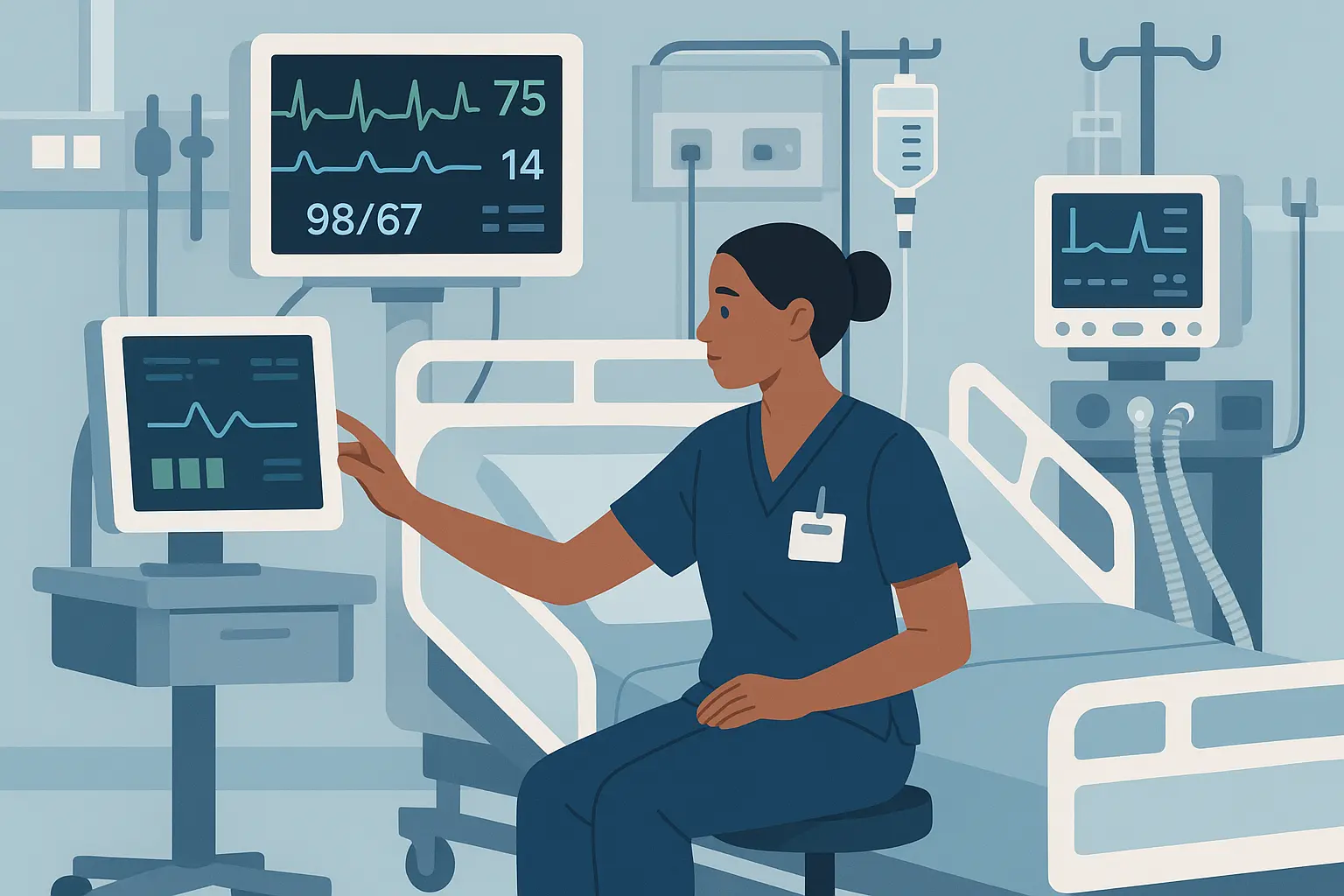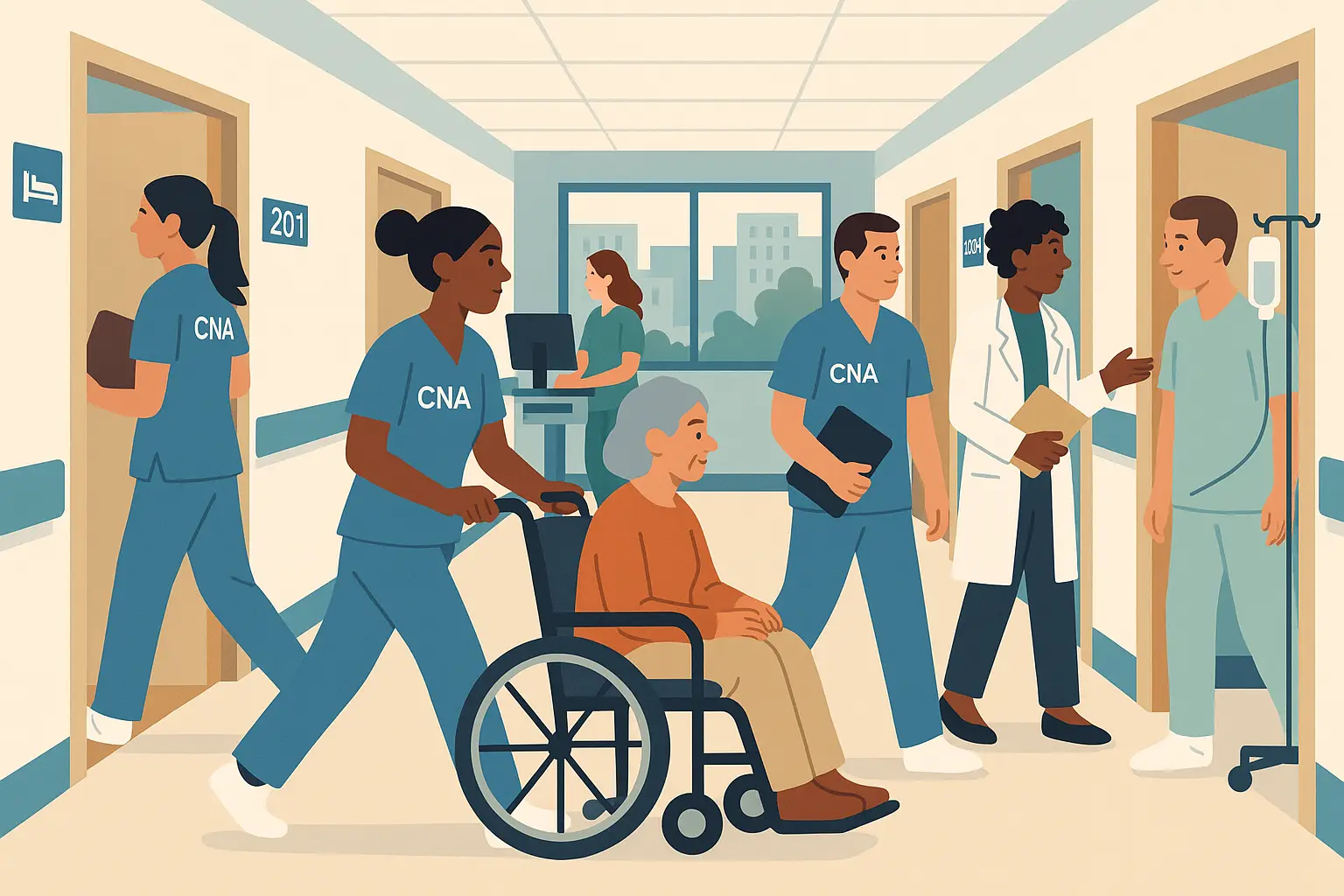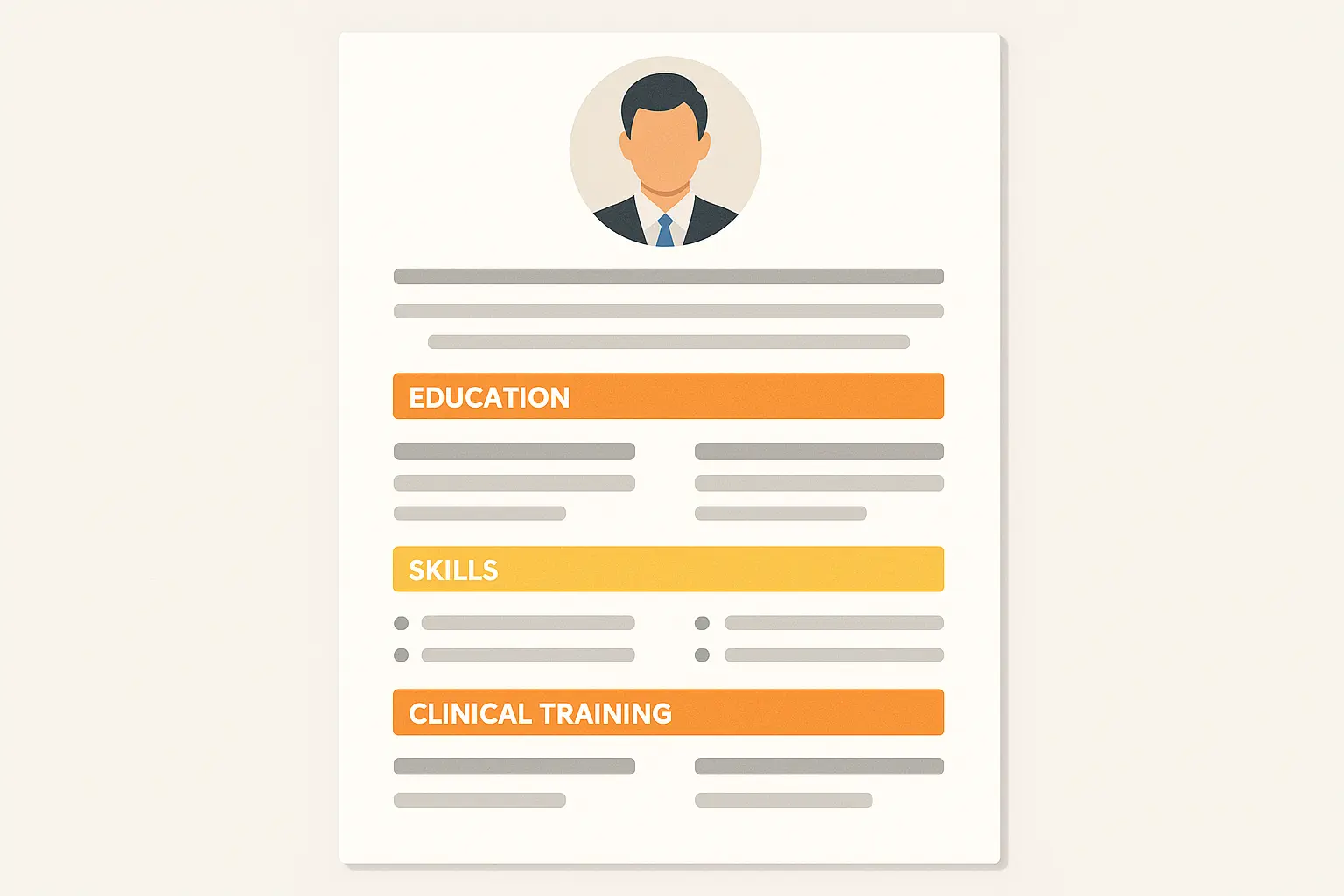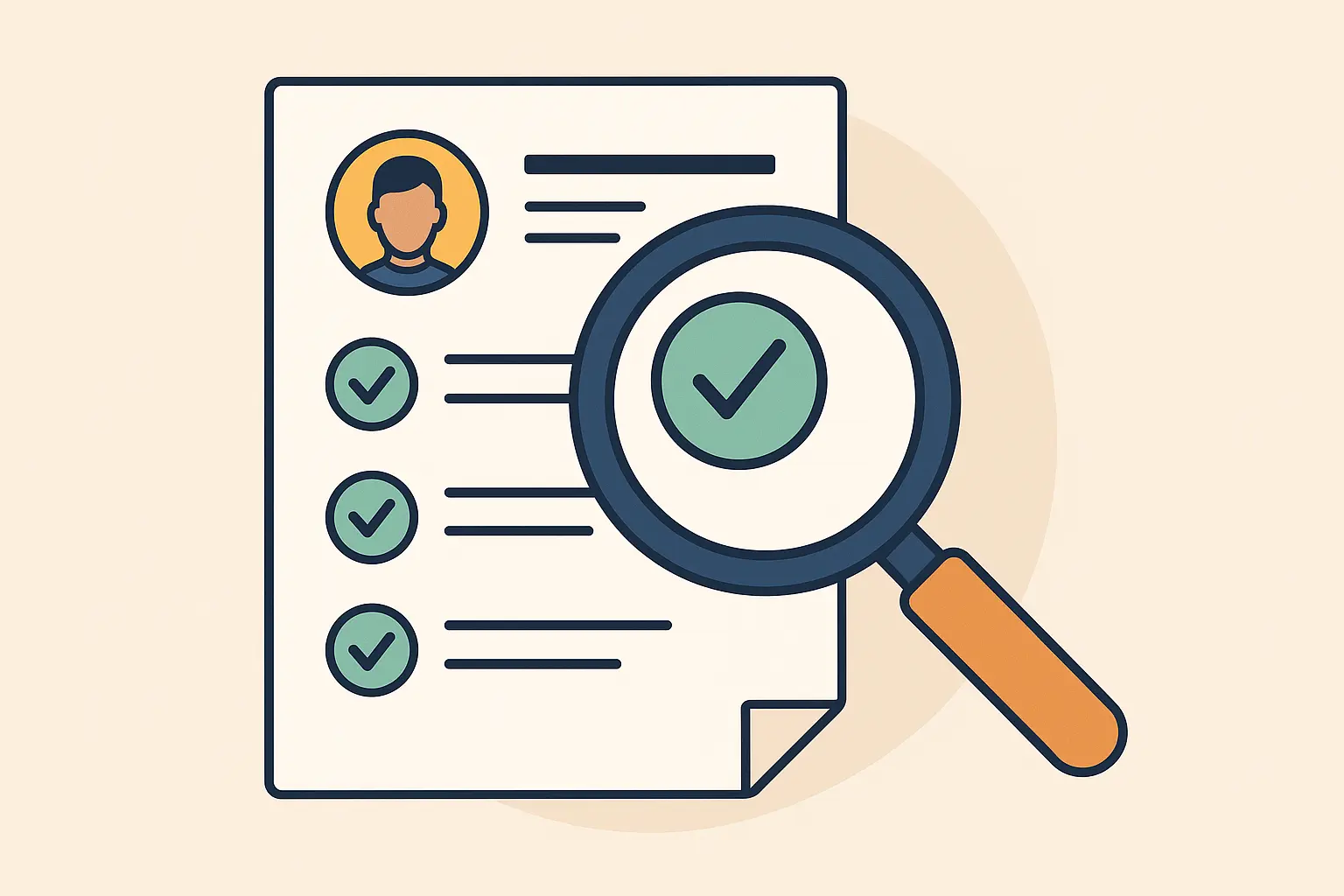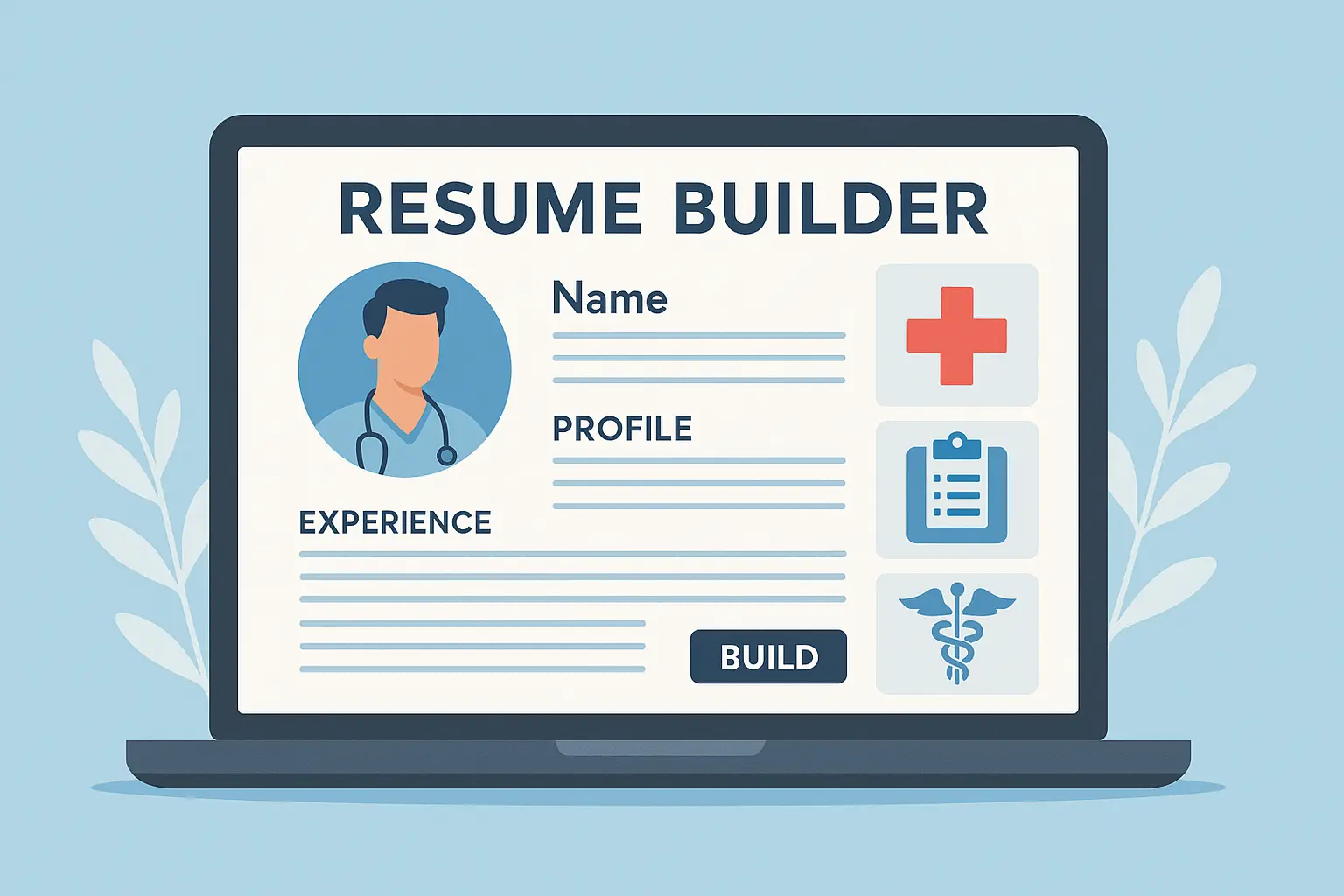25 CNA Resume Examples That Actually Get You Hired (Plus Expert Tips)

When my sister graduated from her CNA program last year, she was so excited to start helping patients. But after sending out dozens of resumes and hearing nothing back, she called me in tears. “I know I can do this job,” she said, “but nobody’s even giving me a chance.” That’s when I realized her resume was the problem—not her skills.
Think about it—every CNA job posting gets swamped with hundreds of applications. I discovered this reality firsthand when helping my sister navigate her job search after completing her CNA certification. Despite her excellent clinical training, her generic resume got lost in the pile until we completely revamped it using proven examples and strategies.
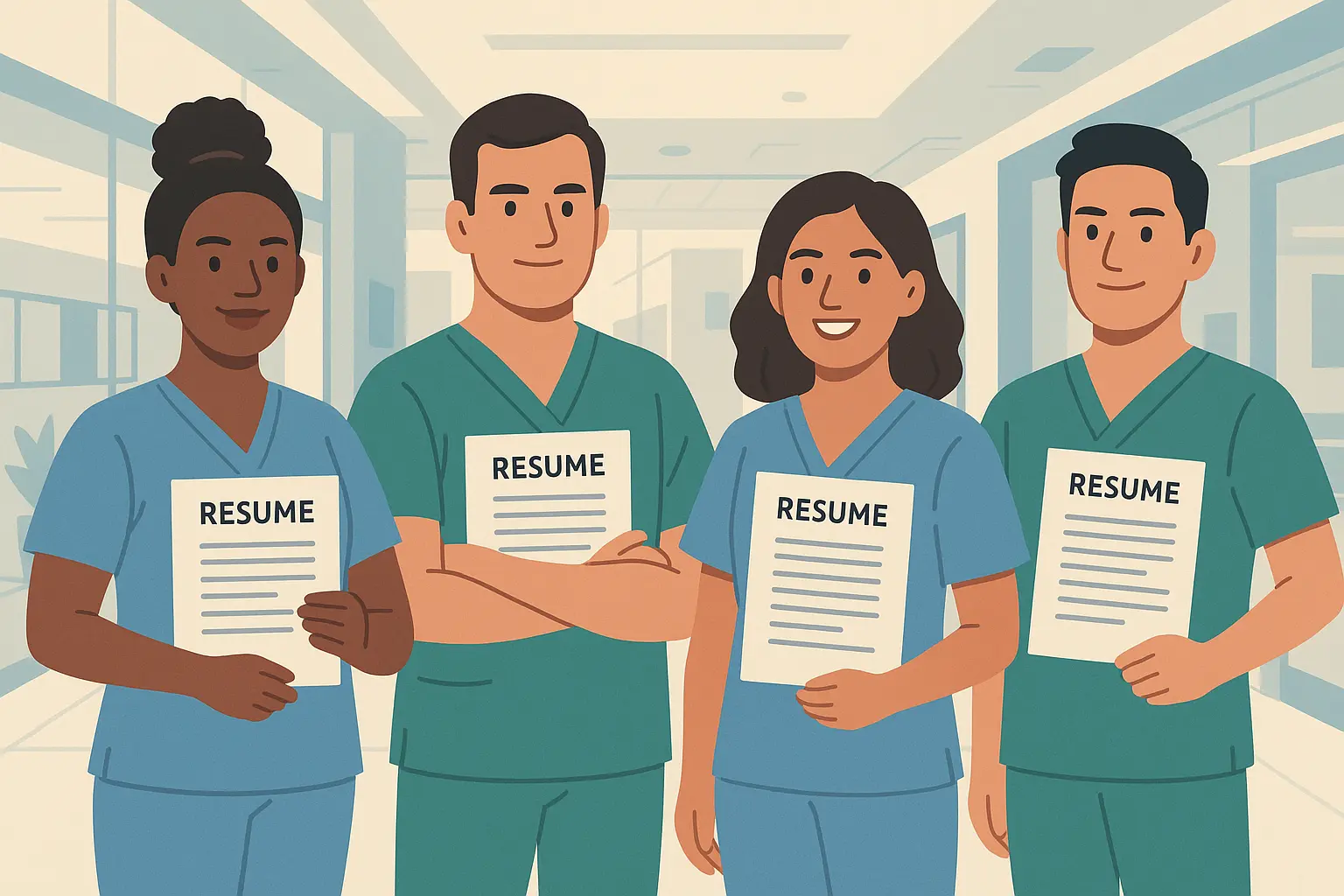
According to Resume Builder’s analysis, every successful CNA resume sample is created and approved by Certified Professional Resume Writers, emphasizing the critical importance of professional presentation in healthcare hiring decisions.
The difference between landing interviews and getting overlooked often comes down to having the right resume format, relevant keywords, and compelling examples that show your real impact on patient care. This guide breaks down 25 proven CNA resume examples that have actually helped nursing assistants land jobs across all kinds of healthcare settings.
Table of Contents
-
What Makes a CNA Resume Example Worth Following
-
25 CNA Resume Examples by Category
-
Entry-Level CNA Resume Examples (Examples 1-5)
-
Experienced CNA Resume Examples (Examples 6-10)
-
Skills-Based CNA Resume Examples (Examples 11-14)
-
Setting-Specific CNA Resume Examples (Examples 15-18)
-
Career Advancement CNA Resume Examples (Examples 19-22)
-
Special Circumstances CNA Resume Examples (Examples 23-25)
-
-
Detailed Resume Breakdowns with Analysis
-
How to Evaluate Resume Examples Against Key Success Factors
-
Resume Builder IQ: Your CNA Resume Success Partner
TL;DR
-
Pick resume examples that actually match your experience level and where you want to work
-
Focus on formats that computer systems can read easily (trust me, almost every hospital uses these now)
-
New CNAs should highlight education, clinical rotations, and skills from other jobs that transfer over
-
Experienced CNAs need to show career growth and what they’re really good at
-
Skills-based resumes work great if you’re changing careers or have gaps in your work history
-
Different workplaces (hospitals, nursing homes, home health) need different approaches
-
If you want to advance your career, show leadership, education, and how you’ve improved things
-
Special situations need honest handling while keeping things professional
-
Real numbers showing what you accomplished make any CNA resume way stronger
-
Customizing for each job application seriously improves your chances of getting interviews
What Makes a CNA Resume Example Worth Following
Look, I get it. Writing about yourself feels weird. You’re probably thinking, “I just want to take care of patients—why do I need to be a marketing expert too?” But here’s the thing: a good resume is just telling your story in a way that helps the right people find you.
Choosing the right CNA resume example isn’t just about finding something that looks professional. You need a format that works for your specific situation while getting past those computer systems that screen resumes before any human even sees them.
Understanding the fundamentals of ATS-friendly resume formatting becomes crucial when selecting CNA resume examples that will successfully navigate automated screening systems.
Making Sure Computer Systems Can Read Your Resume
Here’s what I’ve learned from helping tons of CNAs: almost every healthcare facility uses computer systems to filter through hundreds of applications first. Your resume needs to include the right medical terms like “certified nursing assistant,” “patient care,” and specific medical vocabulary. But don’t just stuff these words in randomly—that actually backfires.
The best examples use normal section headings like “Work Experience” and “Education” instead of trying to be creative with “My Amazing Journey” or whatever. The computer gets confused by fancy stuff, and you don’t want to get filtered out because of a cute heading.
Quick heads up: Don’t get caught up trying to make your resume look “fancy” with colors and graphics. I know it’s tempting, but those computer systems hate that stuff. Stick with black text on white paper—boring works.
|
What Computer Systems Like |
What to Look For |
What Messes Them Up |
|---|---|---|
|
Section Headers |
Work Experience, Education, Skills, Certifications |
Creative titles like “My Journey” or “What I Bring” |
|
Formatting |
Clean lines, normal fonts, regular bullet points |
Graphics, tables, columns, weird fonts |
|
Keywords |
Medical terms used naturally throughout |
Cramming keywords in randomly |
|
File Format |
Word doc or PDF with actual text |
Image files or overly complex PDFs |
Matching Your Actual Experience Level
Different career stages need completely different approaches, and trying to fake it usually backfires. New CNAs should focus on education, clinical rotations, volunteer work, and skills from other jobs that actually transfer over. These resumes typically put education first and highlight relevant coursework or certifications.
If you’ve been doing this for a while, your resume should lead with your work experience and show how you’ve grown in your career. Focus on what you’ve specialized in, any leadership roles, and real numbers that show your impact on patient care.
Bottom line: Pick the example that matches where you actually are in your career. Don’t try to fake having experience you don’t have—hiring managers can spot that from a mile away. Instead, own your level and show why that’s exactly what they need.
Understanding Healthcare Expectations
CNA resumes have unique expectations around certifications, clinical skills, and how you document patient care. Good examples show you understand healthcare-specific requirements while keeping the tone professional but not stuffy.
The best examples demonstrate you know about HIPAA regulations, infection control, and patient safety standards. They use appropriate medical terminology without overwhelming the non-clinical people who might review applications initially (yes, sometimes HR screens resumes first before they get to nursing supervisors).
Entry-Level CNA Resume Examples (Examples 1-5)
If you’re just starting your CNA career, you need resume examples that highlight your potential rather than years of experience you don’t have yet. These five examples show how to present your qualifications in a compelling way when you’re new to healthcare.
When crafting entry-level applications, consider reviewing proven resume objective examples to create compelling opening statements that highlight your dedication to patient care.
1. Fresh Out of School CNA Resume
This example works perfectly if you just graduated from a CNA program and don’t have much healthcare work experience yet. The format puts your education and clinical training front and center, emphasizing those 120+ hours of hands-on patient care you got during your certification program.
Here’s what makes it work: your GPA gets prominent placement (if it’s 3.5 or higher), detailed descriptions of your clinical rotations, and lists of relevant coursework. That little paragraph at the top focuses on your dedication and eagerness to contribute rather than trying to claim years of experience you don’t have.
The skills section balances technical stuff you can do (taking vital signs, using electronic health records) with the soft skills you developed during training (compassion, communication). This shows you’re ready for professional responsibilities while being honest about still having more to learn.
Here’s what that opening paragraph might look like for a recent graduate:
“Compassionate and dedicated Certified Nursing Assistant with recent certification from ABC Healthcare Institute and 120+ hours of clinical training across medical-surgical, pediatric, and long-term care settings. Proved ability to monitor vital signs, assist with patient mobility, and document care in electronic health records during clinical rotations. Ready to bring strong work ethic and patient-centered approach to a dynamic healthcare team while continuing to grow professionally.”
2. Career Changer CNA Resume
Maybe you’re like Jennifer, who worked at Target for three years before becoming a CNA. She was worried her retail experience didn’t matter, but actually? Dealing with difficult customers, staying calm under pressure, managing multiple tasks—that’s basically half of what you do as a CNA right there.
Career changers need examples that highlight transferable skills from previous industries. This format uses a skills-based approach, emphasizing customer service experience, attention to detail, and people skills that translate directly to patient care.
That opening paragraph explicitly addresses the career change, positioning previous experience as an asset rather than something to apologize for. Restaurant servers can emphasize multitasking abilities and customer satisfaction. Administrative professionals can highlight attention to detail and keeping things confidential.
Work experience sections reframe previous roles to highlight healthcare-relevant achievements. The key is showing how what you did before actually prepared you for this.
3. Student CNA Resume
If you’re working as a CNA while pursuing your nursing degree, you need examples that balance current responsibilities with educational commitments. This format emphasizes flexibility, academic achievements, and long-term career goals.
The education section prominently features your current nursing program enrollment with expected graduation dates. This immediately tells employers you’re committed to advancing in healthcare, making you a valuable long-term investment.
Work experience sections highlight part-time or per diem work capabilities while maintaining strong academic performance. Including Dean’s List recognition or relevant academic projects shows you can excel in multiple areas at once.
4. Military to Civilian CNA Resume
If you’re a veteran with military medical experience, you need examples that translate military terminology into civilian healthcare language. This format emphasizes leadership experience, ability to work under pressure, and familiarity with medical protocols.
Military medical training gets prominent placement, with clear explanations of what that means in civilian terms. For example, “Combat Medic” becomes “Emergency Medical Care Provider” with detailed descriptions of trauma response and patient stabilization experience.
Security clearance information can be valuable for certain healthcare facilities, particularly those serving veteran populations or working with government contracts. Leadership experience from military service shows supervisory potential and team collaboration abilities.
5. Heavy Volunteer Experience Resume
If you’ve done tons of unpaid healthcare work, you need examples that properly value those contributions. This format treats volunteer work with the same respect as paid positions, emphasizing skills development and patient care impact.
Volunteer experience sections use identical formatting to professional experience, including real numbers and specific responsibilities. This approach shows that unpaid work still provided valuable patient care experience and skill development.
Community service emphasis appeals to healthcare facilities with strong community mission focus. Many hospitals and clinics value candidates who show commitment to serving others beyond just paid work.
Experienced CNA Resume Examples (Examples 6-10)
If you’ve been doing this for a while, you need resume examples that showcase your career growth and specialized expertise. These five examples show how to present your professional journey in a compelling way while highlighting unique skills you’ve developed over years of patient care.
6. Hospital CNA Resume
Hospital experience requires examples that emphasize your ability to handle fast-paced environments and acute care expertise. This format highlights experience across multiple departments, knowledge of emergency procedures, and comfort with various medical equipment.
Work experience sections put real numbers on patient loads, emphasizing ability to manage 15-20 patients per shift while maintaining quality care standards. Specific achievements include patient satisfaction ratings, emergency response times, and collaboration with interdisciplinary teams.
Technical skills get prominent placement, including EMR systems (Epic, Cerner), telemetry monitoring, and specialized equipment operation. These competencies distinguish hospital CNAs from those in other settings and show adaptability to complex medical environments.
7. Long-Term Care CNA Resume
Long-term care specialization requires examples emphasizing relationship building, dementia care, and expertise in activities of daily living. This format highlights ability to provide consistent, compassionate care for elderly residents over extended periods.
Patient relationship achievements get special emphasis, including family communication success stories and resident satisfaction improvements. Specific metrics might include reduction in behavioral incidents or improvement in resident participation in activities.
Specialized training in dementia care, fall prevention, and end-of-life support shows commitment to geriatric care excellence. These certifications demonstrate dedication to serving elderly populations with dignity and respect.
8. Home Health CNA Resume
Home health experience requires examples emphasizing independent decision-making and one-on-one patient relationships. This format highlights autonomous work capabilities, transportation reliability, and family collaboration skills.
Professional achievements focus on patient outcome improvements achieved through individualized care plans. Examples include medication compliance improvements, mobility progress, and successful discharge planning coordination.
Flexibility and reliability get special emphasis, as home health positions require consistent scheduling and ability to adapt to various home environments. References to clean driving record and reliable transportation show practical readiness for home-based care.
|
Healthcare Setting |
Key Skills to Emphasize |
Numbers to Include |
Special Requirements |
|---|---|---|---|
|
Hospital |
Fast-paced care, technology skills, emergency response |
Patient load (15-20 patients), satisfaction scores, response times |
EMR systems, telemetry, acute care protocols |
|
Long-Term Care |
Relationship building, dementia care, daily living assistance |
Behavioral incident reduction, family satisfaction, activity participation |
Dementia certification, fall prevention, end-of-life care |
|
Home Health |
Independent work, family collaboration, transportation |
Patient outcome improvements, compliance rates, care plan success |
Clean driving record, reliable transportation, independent decision-making |
|
Pediatric |
Child development, family-centered care, age-appropriate communication |
Anxiety reduction, developmental milestones, family education success |
Pediatric certifications, play therapy, child safety protocols |
9. Pediatric CNA Resume9. Pediatric CNA Resume
Pediatric specialization requires examples emphasizing child development knowledge and family-centered care approaches. This format highlights age-appropriate communication skills, play therapy techniques, and family support capabilities.
Patient care achievements focus on child-specific outcomes such as anxiety reduction during procedures, successful feeding programs for infants, or developmental milestone support. These metrics show understanding of pediatric care complexities.
Family education and support get prominent placement, as pediatric care involves extensive parent and caregiver collaboration. Examples include successful discharge teaching, behavior management support, and crisis intervention assistance.
10. Specialty Unit CNA Resume
Specialty units (ICU, OR, ER) require examples emphasizing advanced procedures, critical thinking, and specialized equipment proficiency. This format highlights high-acuity patient care experience and ability to function in life-or-death situations.
Technical competencies get extensive coverage, including ventilator monitoring, surgical assistance, and emergency response protocols. These skills show readiness for the most challenging healthcare environments.
Continuing education emphasis shows commitment to staying current with rapidly evolving specialty care standards. Certifications in ACLS, PALS, or specialty-specific training demonstrate dedication to professional excellence.
Skills-Based CNA Resume Examples (Examples 11-14)
Skills-based resume examples work exceptionally well for CNAs with diverse backgrounds or those moving between different healthcare settings. These four examples show how to emphasize what you can do over the chronological order of your work history.
For comprehensive guidance on highlighting your strongest abilities, explore our detailed hard skills resume guide which complements skills-based CNA resume formatting strategies.
11. Tech-Savvy CNA Resume
If you’re really good with technology and medical equipment, you need examples that highlight those competencies. This format emphasizes EMR proficiency, medical device operation, and technical certifications that set you apart from other candidates.
Skills sections lead with specific software competencies (Epic, Cerner, Meditech) and medical equipment experience (telemetry monitors, IV pumps, glucose meters). These technical abilities often determine hiring decisions in modern healthcare facilities.
Professional achievements focus on technology implementation success, training other staff on new systems, or improving documentation accuracy through technical expertise. These accomplishments show value beyond basic patient care duties.
12. Communication Expert CNA Resume
If you speak multiple languages or have exceptional communication abilities, you need examples that highlight these valuable skills. This format emphasizes language skills, cultural competency, and patient advocacy achievements.
Language abilities get prominent placement, including specific dialects and proficiency levels. In diverse communities, bilingual CNAs command higher salaries and have significantly more job opportunities.
Patient advocacy achievements show communication impact, such as successful resolution of patient complaints, improvement in patient satisfaction scores, or effective family conference facilitation. These outcomes prove communication skills translate to better patient care.
Here’s what that opening paragraph might look like for a multilingual CNA:
“Bilingual Certified Nursing Assistant fluent in English and Spanish with 4+ years serving diverse patient populations. Proven track record of reducing patient complaint rates by 35% through improved cross-cultural communication and serving as primary interpreter for 40+ Spanish-speaking patients weekly. Expertise in patient advocacy, family education, and cultural competency with measurable improvements in patient satisfaction scores.”
13. Leadership-Ready CNA Resume
If you have supervisory experience or leadership potential, you need examples that highlight these advancement-ready competencies. This format emphasizes team leadership, mentoring experience, and quality improvement initiatives.
Leadership achievements get detailed coverage, including number of staff supervised, training programs developed, or quality metrics improved. These accomplishments show readiness for charge nurse or supervisory roles.
Professional development activities show commitment to career advancement, including leadership courses, management training, or committee participation. These experiences position you for promotion opportunities within healthcare organizations.
14. Rehabilitation-Focused Resume
If you specialize in rehabilitation or physical therapy support, you need examples emphasizing mobility assistance, therapeutic activities, and recovery progress tracking. This format highlights specialized skills in helping patients regain independence.
Rehabilitation achievements focus on patient mobility improvements, successful discharge outcomes, and collaboration with physical therapy teams. Specific metrics might include percentage of patients achieving mobility goals or reduction in fall incidents.
Specialized training in transfer techniques, assistive device usage, and therapeutic exercise support shows commitment to rehabilitation excellence. These competencies are highly valued in rehabilitation hospitals and skilled nursing facilities.
Setting-Specific CNA Resume Examples (Examples 15-18)
Different healthcare settings require distinct skill sets and experience emphasis. These four examples show how to tailor your resume for specific work environments and their unique demands.
15. Rural Healthcare CNA Resume
Rural healthcare positions require examples emphasizing versatility and broad skill sets for smaller facilities with limited resources. This format highlights ability to handle multiple responsibilities and adapt to various patient care needs.
Work experience sections emphasize diverse competencies, from emergency care to routine wellness visits. Rural CNAs often function as medical assistants, lab technicians, and patient educators simultaneously, requiring exceptional adaptability.
Community connection gets special emphasis, as rural healthcare providers often serve the same families for generations. Long-term community relationships and understanding of local health challenges show valuable cultural competency.
16. Urban Hospital CNA Resume
Large city hospitals require examples emphasizing high-volume patient care and efficiency in fast-paced environments. This format highlights ability to manage heavy patient loads while maintaining quality care standards.
Patient volume metrics get prominent placement, showing ability to handle 20+ patients per shift while maintaining safety standards. Urban hospitals value CNAs who can work efficiently without compromising patient care quality.
Diversity experience shows ability to serve multicultural patient populations with varying language needs, cultural backgrounds, and socioeconomic circumstances. This competency is essential in urban healthcare settings.
17. Travel CNA Resume
Travel nursing positions require examples emphasizing adaptability and quick integration into new healthcare teams. This format highlights flexibility, rapid learning ability, and success across multiple facility types.
Assignment history shows successful adaptation to various healthcare systems, patient populations, and facility protocols. Travel CNAs must prove ability to become productive team members quickly without extensive orientation periods.
Flexibility achievements include successful completion of diverse assignments, positive feedback from multiple facilities, and ability to extend contracts based on performance. These outcomes demonstrate reliability and professional excellence.
18. Private Practice CNA Resume
Outpatient clinic positions require examples emphasizing administrative skills alongside patient care competencies. This format highlights scheduling abilities, insurance knowledge, and preventive care experience.
Administrative achievements get equal emphasis with clinical skills, including appointment scheduling efficiency, insurance verification accuracy, and patient flow optimization. Private practices value CNAs who can handle both clinical and business responsibilities.
Preventive care experience shows understanding of wellness-focused healthcare delivery, including health screenings, patient education, and chronic disease management support. These competencies align with private practice emphasis on preventive medicine.
Career Advancement CNA Resume Examples (Examples 19-22)
Career advancement requires resume examples that position your CNA experience as a stepping stone to higher-level healthcare roles. These four examples show how to showcase leadership potential and educational commitment.
When planning career transitions, understanding professional resume formatting principles helps present your advancement goals effectively while maintaining clinical credibility.
19. CNA to RN Transition Resume
If you’re in nursing school, you need examples that emphasize educational progress and clinical excellence preparation. This format highlights current RN program enrollment, academic achievements, and leadership development within CNA roles.
Educational progress gets prominent placement, including current GPA, expected graduation date, and relevant coursework completed. This information immediately signals serious commitment to nursing career advancement.
Clinical excellence achievements show readiness for increased responsibilities, including precepting new staff, participating in quality improvement initiatives, and maintaining exceptional patient satisfaction scores. These accomplishments show preparation for RN-level decision-making.
Here’s what that opening paragraph might look like for career advancement:
“Experienced Certified Nursing Assistant with 3+ years acute care experience, currently enrolled in RN program with 3.8 GPA and expected graduation May 2025. Demonstrated leadership through mentoring 12+ new CNAs and participating in quality improvement initiatives that reduced patient fall rates by 25%. Seeking to leverage clinical expertise and educational progress in a progressive healthcare role supporting RN transition.”
20. CNA Supervisor Resume
Supervisory positions require examples emphasizing management experience and oversight capabilities. This format highlights staff supervision, scheduling responsibilities, and quality assurance achievements.
Management achievements focus on team leadership outcomes, including staff retention rates, training program development, and performance improvement initiatives. These metrics show effective supervisory capabilities.
Quality assurance experience shows understanding of regulatory compliance, policy development, and continuous improvement processes. These competencies are essential for CNA supervisory roles in any healthcare setting.
21. CNA Instructor Resume
Teaching positions require examples emphasizing education experience and curriculum development abilities. This format highlights mentoring capabilities, training program creation, and student success outcomes.
Educational achievements include formal teaching experience, curriculum development projects, and student pass rate improvements. These accomplishments show ability to transfer knowledge effectively to new healthcare professionals.
Professional development in education shows commitment to teaching excellence, including instructor certifications, continuing education in teaching methods, and participation in educational conferences or workshops.
22. Healthcare Administrator Track Resume
Administrative career paths require examples emphasizing business skills and project management capabilities. This format highlights data analysis skills, compliance knowledge, and operational improvement achievements.
Administrative achievements focus on process improvements, cost reduction initiatives, and regulatory compliance success. These outcomes show understanding of healthcare business operations beyond direct patient care.
Technology proficiency gets special emphasis, including database management, reporting systems, and quality metrics analysis. These technical skills are essential for healthcare administrative roles.
Special Circumstances CNA Resume Examples (Examples 23-25)
Unique career circumstances require specialized resume approaches that address potential employer concerns while emphasizing your professional value. These three examples handle common special situations effectively.
23. Returning to Work CNA Resume
Career re-entry requires examples that address employment gaps while emphasizing skills maintenance and readiness to return. This format highlights continuing education, volunteer work, and personal experiences that maintained healthcare competencies.
Continuing education gets prominent placement, including refresher courses, certification renewals, and skills updates completed during absence. This information shows commitment to maintaining professional competency.
Volunteer experience during career breaks shows continued healthcare involvement and skill application. Even unpaid work demonstrates ongoing commitment to patient care and professional development.
24. Part-Time/PRN CNA Resume
Per diem positions require examples emphasizing flexibility and reliability for as-needed work. This format highlights availability for various shifts, experience across multiple facilities, and consistent performance ratings.
Flexibility achievements include successful completion of last-minute assignments, positive feedback from multiple supervisors, and ability to adapt quickly to different facility protocols. These outcomes show reliability for PRN work.
Multi-facility experience shows adaptability and broad competency base, valuable for per diem positions that may involve working in various healthcare settings with different patient populations and protocols.
25. CNA with Disabilities Resume
Accommodation needs require examples that emphasize abilities while addressing potential employer concerns about workplace modifications. This format highlights successful accommodation history and unique patient empathy perspectives.
Accommodation success stories show effective workplace modifications that enabled excellent job performance. These examples demonstrate to employers that reasonable accommodations can result in exceptional employee contributions.
Unique perspective value emphasizes how personal experience with disabilities enhances patient empathy and advocacy abilities. This positioning turns potential perceived limitations into professional strengths.
Detailed Resume Breakdowns with Analysis
Understanding what makes specific resume examples successful requires detailed analysis of their components. Let me walk you through three standout examples that consistently generate interview requests.
For additional guidance on crafting compelling opening statements, review our comprehensive resume summary examples to complement your CNA resume development.
Entry-Level Excellence: Recent Graduate Analysis
Take Sarah Johnson’s recent graduate resume—it demonstrates perfect entry-level positioning. Her header includes professional email formatting and LinkedIn profile, immediately establishing digital presence expectations for healthcare professionals.
That opening paragraph avoids common entry-level mistakes by focusing on dedication and specific training rather than claiming extensive experience. “Compassionate and dedicated Certified Nursing Assistant with recent certification and 120 hours of clinical training” immediately establishes qualifications without overselling capabilities.
Skills sections balance technical competencies (vital signs monitoring, EHR systems) with essential soft skills (patient care, communication). This balance shows readiness for professional responsibilities while acknowledging areas for continued growth and development.
Clinical experience descriptions treat training rotations as legitimate professional experience, using action verbs and real numbers. “Provided direct patient care under supervision for 30+ patients” demonstrates real hands-on experience despite supervised status.
Experienced Professional: Hospital CNA Analysis
Michael Rodriguez’s hospital resume exemplifies experienced professional presentation. His opening paragraph immediately establishes credibility with “5+ years in acute care hospital settings” and specific department experience.
Real numbers throughout demonstrate measurable impact: “98% patient satisfaction rating over past 12 months” and “Mentor 8 new CNA staff members.” These metrics prove professional excellence and leadership development.
Technical competencies get detailed coverage, including specific EMR systems (Epic) and specialized procedures. This technical depth distinguishes experienced professionals from entry-level candidates and shows readiness for complex healthcare environments.
Career progression shows advancement from medical-surgical units to emergency department, indicating professional growth and increased responsibility acceptance. This trajectory suggests continued advancement potential.
Skills-Based Success: Communication-Focused Analysis
Maria Gonzalez’s communication-emphasized resume demonstrates effective skills-based formatting. Her header immediately highlights bilingual capabilities, a valuable asset in diverse healthcare communities.
The opening paragraph positions language skills as professional assets rather than personal characteristics. “Fluent in English and Spanish with proven ability to bridge communication gaps” emphasizes patient care impact rather than just linguistic ability.
Real numbers for communication achievements include “Serve as primary Spanish interpreter for 40+ patients weekly” and “Reduced patient complaint rate by 35% through improved communication.” These metrics prove communication skills translate to better patient outcomes.
Cultural competency emphasis appeals to healthcare facilities serving diverse populations, positioning language skills as essential patient care tools rather than convenient additions.
How to Evaluate Resume Examples Against Key Success Factors
Selecting the right resume example requires systematic evaluation against proven success factors. Understanding these criteria helps you choose formats that will actually generate interview opportunities.
Before finalizing your selection, utilize an ATS resume checker to ensure your chosen format will successfully navigate automated screening systems used by healthcare facilities.
Computer System Compatibility Assessment
Modern healthcare hiring relies heavily on computer screening systems, making compatibility your first evaluation priority. Excellent examples use clean formatting with standard section headers such as “Work Experience” and “Education” rather than creative alternatives.
Keyword optimization appears natural throughout top-performing examples, incorporating terms including “certified nursing assistant,” “patient care,” and “vital signs monitoring” without obvious stuffing. The best examples achieve 2-3% keyword density while maintaining readable, professional tone.
Formatting consistency remains crucial for computer system success. Superior examples maintain identical bullet point styles, consistent date formatting, and uniform font usage throughout. These technical details significantly impact scanning accuracy and ranking algorithms.
|
Resume Quality Factor |
Excellent Examples Include |
Poor Examples Contain |
|---|---|---|
|
Computer Optimization |
2-3% keyword density, standard headers, clean formatting |
Keyword stuffing, creative headers, complex layouts |
|
Experience Alignment |
Relevant achievements, appropriate emphasis, career progression |
Mismatched focus, inflated claims, irrelevant details |
|
Healthcare Standards |
Medical terminology, compliance awareness, patient-centered language |
Generic descriptions, non-medical focus, unprofessional tone |
|
Professional Presentation |
Error-free content, consistent formatting, appropriate length |
Grammar errors, inconsistent style, excessive length |
Experience Level Alignment Evaluation
Entry-level examples excel when they emphasize education, clinical training, and transferable skills rather than attempting to inflate limited experience. The most effective formats lead with education sections and highlight relevant coursework, certifications, and volunteer experience.
Experienced professional examples show career progression through increasingly responsible positions, specialized competencies, and leadership development. These formats emphasize real achievements and professional growth rather than basic job duties.
Career advancement examples successfully bridge current CNA experience with future goals, highlighting educational progress, leadership development, and specialized training that prepares for higher-level positions.
Healthcare Industry Standards Compliance
Superior healthcare resume examples show understanding of medical terminology, patient safety protocols, and regulatory compliance requirements. They use appropriate clinical language without overwhelming non-medical hiring managers who may conduct initial screenings.
Professional tone throughout reflects healthcare industry expectations for attention to detail and clear communication. The best examples maintain formal language while conveying compassion and patient-centered focus.
Certification and continuing education emphasis shows commitment to professional development and regulatory compliance, essential factors in healthcare hiring decisions.
Professional Presentation Quality Standards
Exceptional examples maintain error-free grammar, consistent formatting, and appropriate length (typically 1-2 pages for CNAs). These technical details show attention to detail essential for patient care responsibilities.
Content organization follows logical progression, making information easy to locate quickly. Busy healthcare hiring managers appreciate resumes that communicate key qualifications efficiently without requiring extensive reading time.
Visual appeal balances professional appearance with readability, using appropriate white space and clear section divisions without excessive graphics or creative elements that might interfere with computer scanning.
Resume Builder IQ: Your CNA Resume Success Partner
Creating an outstanding CNA resume that excels across all success criteria—computer optimization, experience alignment, healthcare standards, and professional presentation—requires specialized expertise and tools designed specifically for healthcare professionals.
Resume Builder IQ’s comprehensive platform addresses the unique challenges CNAs face in today’s competitive job market. Our healthcare-specific templates understand the distinct requirements of nursing assistant positions, ensuring proper formatting for both automated systems and human recruiters.
Advanced computer screening technology provides real-time scoring against actual CNA job postings, ensuring optimal keyword density and formatting compatibility with healthcare facility systems. This technology eliminates guesswork about whether your resume will successfully navigate initial screening processes.
Industry-specific guidance includes access to 500+ resume examples, including specialized CNA samples across all experience levels and healthcare settings. Expert tips tailored specifically to healthcare careers help you avoid common mistakes while highlighting your strongest qualifications.
Mobile-friendly creation capabilities allow busy healthcare professionals to build and edit resumes between shifts, perfect for CNAs who need to apply for positions quickly in today’s fast-moving job market.
Whether you’re a new graduate creating your first professional resume or an experienced CNA seeking advancement opportunities, Resume Builder IQ provides the specialized tools and healthcare industry expertise needed to create resumes that open doors. Start building your professional CNA resume today and take the next step in your healthcare career.
Final Thoughts
Success in CNA job searching depends heavily on presenting your qualifications through the right resume format for your specific situation and career goals. The 25 examples covered in this guide show that there’s no one-size-fits-all approach—new CNAs need different strategies than experienced professionals, and specialized settings require unique emphasis areas.
Now, I’m not gonna lie—some of these examples might feel intimidating if you’re just starting out. That’s okay! Everyone starts somewhere, and the CNAs with impressive resumes today were once exactly where you are now.
Remember that the most beautiful resume won’t help if it doesn’t pass computer screening or fails to highlight the specific competencies healthcare employers seek. Focus on choosing examples that align with your experience level, target healthcare setting, and career advancement goals while maintaining the professional standards expected in medical environments.
If you’re reading this thinking “I don’t have enough experience” or “I’m not good enough”—stop right there. Every single experienced CNA you admire started with zero experience. Your willingness to learn and care for people is what matters most.
Your CNA resume represents more than just your work history—it’s your first opportunity to show the attention to detail, professional communication, and patient-centered focus that define excellent nursing assistants. Take time to customize your chosen format for each application, emphasizing the specific qualifications and achievements most relevant to each position.
The healthcare industry continues evolving rapidly, with new technologies, treatment approaches, and patient care standards emerging regularly. Your resume should reflect where you’ve been and your commitment to continued learning and professional growth in this dynamic field.
This isn’t gonna happen overnight. Give yourself a few hours to really work on this, not 20 minutes between Netflix episodes. Your future self will thank you.
Look, at the end of the day, healthcare needs good people who care about patients. If that’s you, then the right job is out there waiting. Sometimes you just need the right resume to help you find each other.
I know it’s annoying that you have to jump through all these hoops just to show people you can do the job. But unfortunately, that’s how the system works right now. The good news? Once you get that first interview, your personality and passion will do the rest of the talking.
Whether you’re just starting your CNA career or seeking advancement opportunities, the right resume format can open doors to the patient care opportunities where you’ll make your greatest impact. You’ve got this—and if you need help, that’s what tools like Resume Builder IQ are for. No shame in getting a little backup when you need it.
